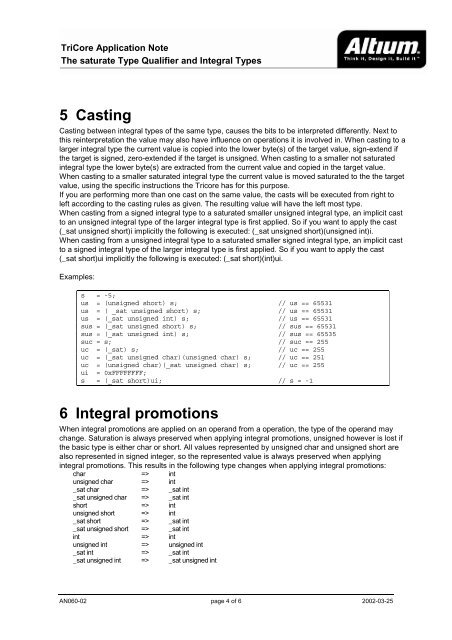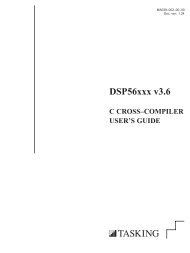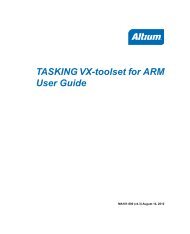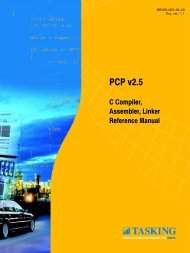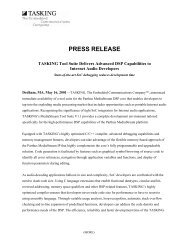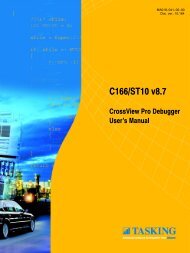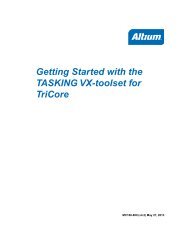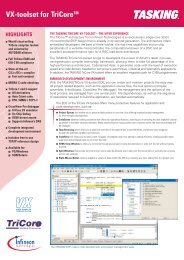TriCore Application Note - Tasking
TriCore Application Note - Tasking
TriCore Application Note - Tasking
- No tags were found...
You also want an ePaper? Increase the reach of your titles
YUMPU automatically turns print PDFs into web optimized ePapers that Google loves.
<strong>TriCore</strong> <strong>Application</strong> <strong>Note</strong>The saturate Type Qualifier and Integral Types5 CastingCasting between integral types of the same type, causes the bits to be interpreted differently. Next tothis reinterpretation the value may also have influence on operations it is involved in. When casting to alarger integral type the current value is copied into the lower byte(s) of the target value, sign-extend ifthe target is signed, zero-extended if the target is unsigned. When casting to a smaller not saturatedintegral type the lower byte(s) are extracted from the current value and copied in the target value.When casting to a smaller saturated integral type the current value is moved saturated to the the targetvalue, using the specific instructions the Tricore has for this purpose.If you are performing more than one cast on the same value, the casts will be executed from right toleft according to the casting rules as given. The resulting value will have the left most type.When casting from a signed integral type to a saturated smaller unsigned integral type, an implicit castto an unsigned integral type of the larger integral type is first applied. So if you want to apply the cast(_sat unsigned short)i implicitly the following is executed: (_sat unsigned short)(unsigned int)i.When casting from a unsigned integral type to a saturated smaller signed integral type, an implicit castto a signed integral type of the larger integral type is first applied. So if you want to apply the cast(_sat short)ui implicitly the following is executed: (_sat short)(int)ui.Examples:s = -5;us = (unsigned short) s; // us == 65531us = ( _sat unsigned short) s; // us == 65531us = (_sat unsigned int) s; // us == 65531sus = (_sat unsigned short) s; // sus == 65531sus = (_sat unsigned int) s; // sus == 65535suc = s; // suc == 255uc = (_sat) s; // uc == 255uc = (_sat unsigned char)(unsigned char) s; // uc == 251uc = (unsigned char)(_sat unsigned char) s; // uc == 255ui = 0xFFFFFFFF;s = (_sat short)ui; // s = -16 Integral promotionsWhen integral promotions are applied on an operand from a operation, the type of the operand maychange. Saturation is always preserved when applying integral promotions, unsigned however is lost ifthe basic type is either char or short. All values represented by unsigned char and unsigned short arealso represented in signed integer, so the represented value is always preserved when applyingintegral promotions. This results in the following type changes when applying integral promotions:char => intunsigned char => int_sat char => _sat int_sat unsigned char => _sat intshort => intunsigned short => int_sat short => _sat int_sat unsigned short => _sat intint => intunsigned int => unsigned int_sat int => _sat int_sat unsigned int => _sat unsigned intAN060-02 page 4 of 6 2002-03-25


